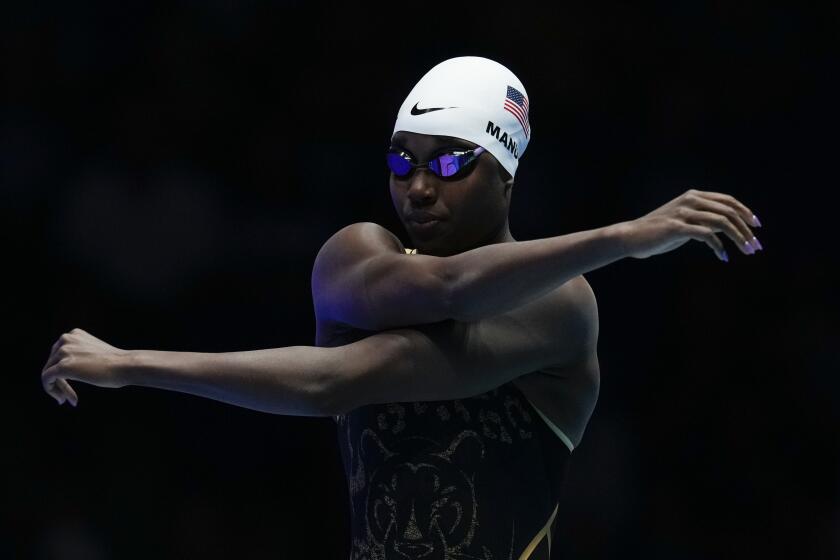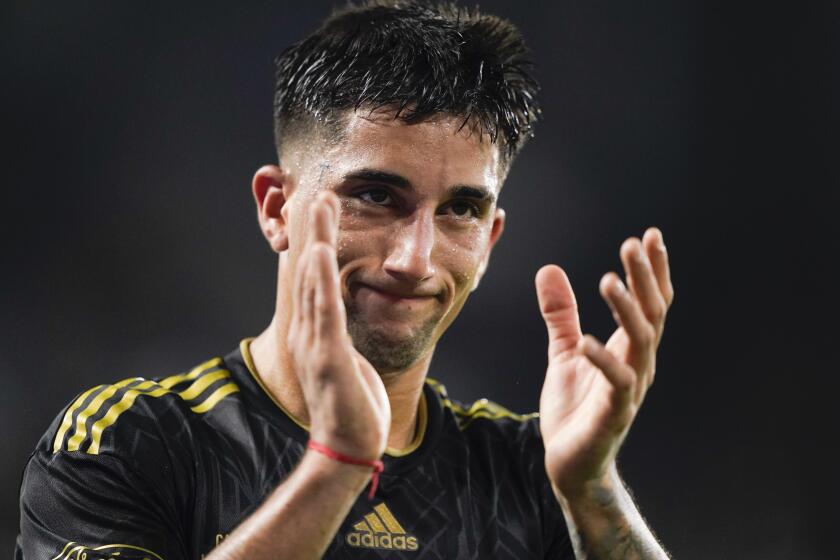SUPER BOWL XXIV: DENVER BRONCOS vs. SAN FRANCISCO 49ERS : This Game Plays Into Their Hands : Montana: 49er quarterback has been so good, his toughest job may be following his own act.
Joe Montana has grown so tired of the question this week that he has managed to pare his answer down to 12, bite-sized syllables.
Joe, what do you think when people say you’re now the greatest quarterback of all time?
“Don’t worry about it,” Montana said Monday. “Talk about it later.”
As for those missing pronouns, please stop by Montana’s press podium Tuesday. Wednesday: compound sentences.
And you thought he was efficient against the Rams. Montana has never been one for Super Bowl productions, unless you’re talking about producing numbers and victories. He’s 3-0 on the field, and looking for No. 4 this week in Super Bowl XXIV against Denver in the Superdome.
Off the field, Montana offers only shutter-speed peeks at his personality. We know he’s working on his third marriage. We know he is self-effacing, cleft-chinned, and during major media crushes, amazingly evasive and bland.
Questions probing his all-time greatness and place in National Football League history are particularly disturbing to Montana who, for all his accomplishments, has spent much of an 11-year career searching for security and acceptance.
Joe Montana? The greatest ever? Look closer.
Between Super Bowl rings and superlatives, in fact, Montana has faced his share of crises.
Before appearing in his first Super Bowl, remember, Montana was to some just a third-round draft choice from Notre Dame who might never have survived in the pros if not for the nurturing hand of a coach, Bill Walsh, who honed a frail but talented quarterback into a system in which he could not fail.
Montana spent the season before his third world championship in 1988 fighting to keep his starting job. Does an all-time legend need these kinds of headaches?
If Montana is the greatest quarterback ever, and the groundswell is mounting, why has he spent so much of his career protecting his backside and peering over his shoulder?
It was only this season that Montana has finally felt comfortable as the 49er starter, he has confided. Walsh’s retirement no doubt lifted a burden, and Montana at long last could tackle football’s chicken-or-the-egg question: Did the system make the quarterback or the quarterback the system?
Also, a noted quarterback controversy between he and Steve Young that Walsh kept burning, if only to provoke Montana to greater ends, was expunged.
The team’s new coach, George Seifert, announced before the first training-camp whistle that an injury-free Montana was a starting Montana.
Montana responded with the greatest statistical season of his career--of anyone’s career--although some longtime 49er watchers insist he has had better seasons, all things considered.
Not for sheer numbers, anyway . . . Montana set the NFL single-season record for efficiency in 1989 with a rating of 112.4. So what’s in a record? The mark he broke was held previously by Cleveland’s Milt Plum, who has never been confused with greatness.
Still, a fourth Super Bowl title this weekend would tie Montana with Pittsburgh’s Terry Bradshaw for most titles for one quarterback. That fact, combined with his remarkable career efficiency and undeniable comeback qualities, might push Montana over the top.
Eternal greatness, though, hasn’t come easy. Montana has had one foot out the door for what has seemed like years.
Steve Young, who has a vested interest, calls him: THE QUARTERBACK WHO WOULDN’T DIE.
Montana first leaned on the ropes back in 1986, when he injured his back in the opener against Tampa Bay. He sat out the second game against the Rams and hit the operating table the next Monday, Sept. 15. In surgery, Dr. Arthur White widened Montana’s spinal canal and removed a ruptured disk.
Montana said this week that White never suggested he retire from football.
“I don’t know what you’re talking about,” Montana told a reporter. “He didn’t ask me to retire. No.”
Contacted Tuesday in San Francisco, however, White recalled vividly what he said when learning that Montana was going to attempt a comeback.
“I said he was crazy,” White said. “Although it was an off-the-cuff statement, modern medicine would say that after spinal surgery, people should not do contact sports. We do not release employees back to heavy labor after surgery.”
Montana returned to the lineup 55 days later, defying medical logic. White said he could have never imagined that Montana’s best days might lie ahead.
“I gave him two years at the most,” White said. “I said ‘If it blows, Joe, I can always fix it up good enough so you can play with the kids.’ But to think he could still take those hits . . . It’s amazing he could take the hits he does and not suffer more pain, and lasted this long. I’m elated, impressed, and really surprised.”
Not as surprised as a quarterback named Young and his agent, Leigh Steinberg.
At the time of Montana’s surgery, Young’s bright career was going nowhere in Tampa Bay. So, the plan was for Young to continue Montana’s legacy in San Francisco. Looked good on paper. Steinberg, who lived in the Bay Area, had blue-lined Montana’s medical reports and circled the words of Montana’s own surgeon.
Young was traded to the 49ers four days before the 1987 draft. At the time, it seemed a perfect move.
“The doctors were saying that Montana should never play again,” Steinberg recalled. “It appeared, for medical reasons, that Montana was approaching the end of his career. Obviously, he has had an amazing resurrection. The reports of his demise were greatly exaggerated.”
Three years later, and now 28, Young is still waiting for Montana’s retirement. With unique abilities of his own, Young has managed only to forge a competitive wedge between him and Montana.
“Joe’s obviously outlasted my expectations, and maybe his own.” Young said this week.
It’s been the ultimate paradox for Young, who loves everything about San Francisco except who plays starting quarterback. How long can Young wait? Montana, 33, has a contract that runs through 1991 at $2.55 million per season. And he’s talking about playing on.
“For now it’s OK,” Young says, “Next week we need to talk about the future.”
Worse yet, Young’s lurking presence seems to have pushed Montana to some of his greater career moments. Not exactly what Young had in mind.
“I hope someday he can look back on this and say, ‘Boy, those were some great days,” Young said. “Because we were always on the edge.”
Young has left his mark, even from the sidelines.
How many guys can make perhaps the greatest quarterback ever sweat out the best years of his career?
Here’s how many times after back surgery Montana has been presumed dead and buried:
In a 1986 NFC playoff game against the New York Giants, nose tackle Jim Burt knocked Montana unconscious in a 49-3 rout of the 49ers. There were doubts Montana would ever return. He did.
In 1987, after a season in which he led the 49ers to a 13-2 record and threw a career-high 31 touchdown passes, the 49ers were again bounced out in the first round, this time by the Minnesota Vikings. Montana was benched in favor of Young in the second half.
The rumors of a Young succession in 1988 were fanned by none other than Walsh himself, who told reporters in training camp that the job was open for competition. Later, he blamed the media for igniting a controversy. Montana didn’t know who started it, but said at the time: “I know Bill didn’t stop it.”
If it was a ploy to light a fire, Montana was sufficiently stoked, although his career took a bleak but brief turn as the 49ers dropped to 6-5 at one point in the season.
Young to the rescue? Not so fast. Montana recovered from an assortment of injuries to lead the 49ers into Super Bowl XXIII, where he engineered his famous last-minute, 89-yard, 10-play scoring drive to beat the Cincinnati Bengals.
Young says it wouldn’t be as frustrating playing behind a legend if he was a sturdier figure in the pocket. Knowing Montana might “blow” at any moment keeps Young’s heart racing and, ultimately, dashes his hopes.
“It’s actually harder,” Young says. “I’m ready to play every week. He gets to get it out of his system. I pound myself in the head and he wonders what I’m doing.”
Young points out he’s played more than a half in six games this season.
Young can’t help but respect Montana’s tenacity. They list him at 6-feet-2 and 195 pounds, but it’s difficult to believe he’s that tall or that heavy. Montana has always been injury prone, dating to his days at Notre Dame, when he was nagged by injuries and missed his junior season with a broken collarbone.
Montana’s had two operations on his left knee, and one apiece on his right shoulder and right elbow. Then, there was that minor back realignment. During one stretch in 1987, he took cortisone injections in a chronically sore right elbow 11 consecutive weeks.
But Montana keeps coming back for more. Why? A love of the game, certainly. There’s another pain-killer he takes called $2.55 million per season.
Montana has suffered this season from various injuries to his ribs, elbow and knee. He has missed three games in 1989 and parts of others.
Montana had his ribs injected with a pain-killer on numerous occasions this season, most notably before a Monday night game against the Rams on Dec. 11. He threw for a career-high 458 yards in the division-title clinching game and took the next week off.
These injections aren’t cholesterol-test pin-pricks, either. For sufficient numbing, doctors have to shoot Montana’s ribs with a series of seven or eight injections. Sometimes he needs one more poke at halftime.
“He’s tough,” Young said. “You can’t help ribs. The injections just take away the edge.”
Some people, noted back surgeons even, can’t believe what Montana is doing.
“He’s functioning now with a back that you or I would not be able to play weekend tennis with,” Dr. White said. “You’d have to give up tennis if you had his back.”
White wouldn’t come right out and say that Montana will need more surgery when his playing days are over. But he came close.
“I don’t know how much I can divulge,” he said. “After each season he is evaluated. We repeat the scans. As one might expect, each season takes its toll. The likelihood of a second surgery is growing with every season and every hit.”
So you think Montana is ready to retire?
“No,” Montana says, “not yet.”
Besides standing, how does he want to be remembered?
“Finally, he’s gone.”
THE QUARTERBACKS
1989 regular season 49ers: Joe Montana
6’ 2”, 195 lbs.
College: Notre Dame
NFL: 11 yrs. Broncos: John Elway
6’3”, 210 lbs.
College: Stanford
NFL: 7 yrs.
Montana PASSING STAT Elway 386 Attempts 416 271 Completed 223 70.2% Percent 53.6% 3,521 Yards 3,051 9.12 Average gain 18 26 Touchdowns 18 95 (TD) Longest gain 69 8 Interceptions 18
More to Read
Go beyond the scoreboard
Get the latest on L.A.'s teams in the daily Sports Report newsletter.
You may occasionally receive promotional content from the Los Angeles Times.







